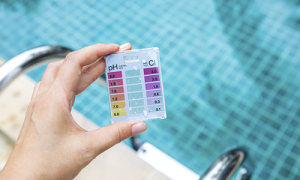10 Residential Swimming Pool Maintenance Tips
On a scorching summer day, nothing is better than seeking respite from the heat with a dip in a cool pool. According to the Association of Pool & Spa Professionals, about 10.4 million American households enjoy the perks of having a pool. But if you neglect to care for it properly, your pool can become a costly burden. Whether you’ve got an inground or above-ground pool, there is regular residential swimming pool maintenance you’ll need to perform.
Residential Swimming Pool Maintenance Tips You Need to Know
Follow these ten maintenance tips from the professionals at Inspect-It 1st to keep your swimming pool clean and inviting all season long.
1. Skim Surface Debris
To keep your pool pristine, skim the water’s surface with a hand-held pool skimmer daily to remove leaves, bugs, and other unwanted debris. Surface debris will eventually sink to the bottom of the pool, making it harder to clean. Regular skimming improves the efficiency of your pool’s water circulation system, increasing its longevity.
Be sure to clean out your pool’s strainer weekly to improve filtration and other systems. Routinely emptying the strainer baskets also minimizes the amount of chlorine necessary to keep the water clean.
2. Check Chemistry Weekly

3. Maintain Water Level
A substantial amount of water will be lost over the course of the swimming season through evaporation and of course, cannonballs. If the pool loses too much water, its pumping system could be damaged. Use your garden hose to fill the up the pool if water levels fall below the center line of your skimmer or pool tile.
4. Clean Your Filters
If your pool were a human body, its filters would be the kidneys. Filters remove impurities from the water. And if your filter is dirty, chances are your pool is too.
Pool Filter
At least once a week, clean out your pool’s filter. Turn the system off and remove the filter’s cap to access the basket and dispose of the debris that it has collected.
Pump Filter
You’ll also want to clean the pool’s pump filter as need. There are three different kinds of pool filters: cartridge, sand, or diatomaceous earth (DE). To clean your sand or DE filter, “backwash” the system. Cartridge filters simply need to be rinsed or replaced periodically. However, filters that are too clean won’t function properly. Check your pool’s manual for more information on caring for the filtration system.
5. Vacuum Pool & Wash Walls
Vacuum your pool periodically for a deeper clean. When vacuuming, move slowly to ensure you do a thorough job. On average, the typical pool requires about 30 minutes of vacuuming.
After vacuuming, scrub down walls and tile to remove dirt and grime. Cleaning the walls of your pool will also eliminate algal buildup and calcium deposit, which can cause problems if left untreated.
6. Clean the Pool Deck
Sweep and power wash the area surrounding your regular to make for an overall inviting space. Pressure washing a few times a season will rid your lawn chairs and deck of rust, dirt, and weather stains.
7. Use a Tennis Ball to Absorb Oil
Whether from suntan lotions or hair products, oils will enter the pool. To combat the excess that inevitably collects in the water, toss in a tennis ball. The fibers of the tennis ball will absorb oil and eliminate the sheen that coats the water’s surface.
8. Get on a Shocking Schedule
To eliminate unpleasant odors or murky appearance (both mean bacteria and organic contaminants have been allowed to build up for too long) you’ll need to ‘shock’ or superchlorinate your pool. Refer to your pool’s manufacturers’ instructions to determine how often your pool needs to be ‘shocked.’
9. Winterize if Necessary
Depending on your local climate, you might have to winterize your swimming pool. When residual water is left in your pool’s pipes, it can freeze and cause damage. If your local climate experience temperatures that drop below freezing, then you’ll need to winterize annually.
10. Receive Regular Inspections
Have your pool and its various systems serviced every so often to avoid having to repair or replace equipment. Inspect-It 1st offers comprehensive and customizable inspections services for residential pools and spas. While some inspection companies only attend to the mechanics of the pool systems, Inspect-It 1st covers components such as the external bonding of equipment, interior finish materials, decks, steps, diving boards, ladders and much more.
If you follow these ten tips from Inspect-It 1st, residential swimming pool maintenance will breeze. And when you’re in need of an inspection or buying or selling a house, contact your local Inspect-It 1st office. For over two decades, Inspect-It 1st has been the nation’s premier property inspection franchise, helping buyers, sellers, real estate agents, and others make smart decisions about their properties.
